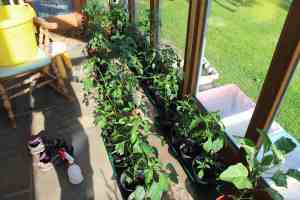Insects are vital participants in our ecosystems. The plight of bees across Europe has entered the media spotlight and penetrated public consciousness. People are talking about our friendly bees who pollinate flowers and crops and provide us with honey.
Here at Ron Mara on the wild west coast of Kintyre I was worried that it would be too windy for many pollinating insects, resulting in poor fruit yields. However, these concerns seem unfounded as we have healthly populations of three bumble bee species, also wasps and hover flies, all of which benefit from the extensive shelter belts we are establishing.
We are also lucky in that Argyll’s agriculture consists of extensive hill grazing rather than intensive arable with its high levels of pesticide/herbicide use. This has put less pressure on insect populations.
My son Peter has been looking after our pepper plants: this has involved spraying daily with seaweed solution to try and keep a check on the burgeoning aphid population. Yesterday he noticed that nearly all the aphids had disappeared. He spotted caterpillar-like larvae who seemed to be eating the remaining pests. A quick check on the internet and he established that they were hover fly larvae.
We were amazed at how effective they were. You read about this in books and feel that organic production is a good thing; however, when you observe biological controls working in your own house it gives you a sense of hope for the future.
- Comment
- Reblog
-
Subscribe
Subscribed
Already have a WordPress.com account? Log in now.
